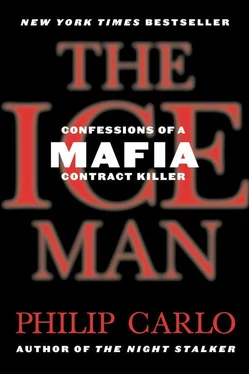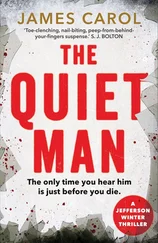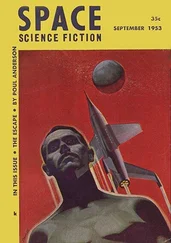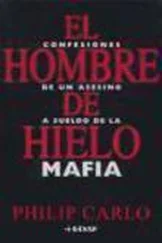Barbara rarely wrote him back. He was, she had come to believe, “a monster.” A monster that had fooled her and duped her and used her.
Richard’s cell at Trenton State’s maximum-security facility is six by eight feet, far too small for a man his size, but he has become used to it, he says. In it there is a toilet bowl, a metal bunk bed bolted to the steel wall, on which is a thin mattress, and a sink; that’s it. He has a small television and can listen to the radio with earphones when he pleases. He doesn’t pace his cell anymore, look at himself in the mirror and curse at what he sees. He has accepted his lot in life, his destiny.
Strangely, Richard seems to have thrived in prison. He has never looked better. He grew a thick salt-and-pepper vandyke, is robust and strong, and moves about as if he owns the place, with a bounce in every step. Everyone knows who he is, prisoners and guards alike, and everyone gives him a wide berth. He secured a job in the prison law library, gives out books and checks books in. The routine in all state prisons across the country is always the same. That routine is an essential part of a successful prison—to teach the inmates that there is a preordained schedule, a mandated regimen which they have to adhere to. Breakfast is served at 6:30 A.M., lunch at 11:30, dinner at 4:30 P.M. Prisoners with jobs are allowed to leave their cells to go to work. In the beginning Richard wanted nothing to do with a job, but he quickly came to realize he couldn’t just sit in his cell, stew, and rot, and so he decided to make the best of the situation.
Prisons are notoriously dangerous places, but hardly anyone wants to tangle with the Ice Man. Richard has grown to like his nickname; he feels it quite appropriate, for he really is like ice, he knows. Since he was a teenager he could kill a human being or torture animals and never think twice about it. He still doesn’t know if he was born that way or was made that way, but he knows he is very different from other people, and he likes that. He is proud of it.
Richard still thinks about his father, still regrets not killing him. If any one factor contributed to his becoming the Ice Man, Richard believes, it was surely Stanley Kuklinski. I’m not blaming anyone for anything, but he made me a mean son of a bitch, I can tell you that.
Richard’s brother Joseph slipped deeply into mental illness. By the time Richard arrived, he’d been in prison some eighteen years. He constantly talked to himself, regularly told other inmates and even guards about the girl he killed. He was proud of it. Most of his teeth had fallen out. He had to be forced to bathe and shower. When he did shower, he kept his clothes on. Over the years he had married several men in prison, and he’d had to have operations on his rectum because he’d been sodomized so often, so roughly.
Richard had absolutely nothing to do with his brother. He never forgot what Joseph had done and still held it against him. Once in a while they passed each other, and Richard acted like he were invisible, looked right through him as if he were a glass of water. Joseph had to be kept in the Special Care Unit. He captured roaches, Trenton Prison guard Silverstein recently explained, dried them, crushed them up, mixed them with sawdust and pencil shavings, and smoked them in rolled-up toilet paper. Joseph told Silverstein that he was married to the child he killed, that she had been his wife. When a parole officer came to see Joseph to talk about his release, he pulled down his pants and mooned the parole officer. Joseph did not want to leave prison; he wanted to die in jail, and that came to pass in the winter of 2003. When Richard heard his brother was dead, he was glad. He still thought of his brother as a rapist, a killer of children, and had no use for him. In life or in death, he recently said.
Richard still passionately hates rapists. The first time he had a problem at Trenton State it was because a fellow inmate in his section was a convicted rapist, and Richard told the man to stay the hell away from him, that if he came near him he’d “break every bone in your miserable fucking body!”
To be threatened by Richard is a frightening, disconcerting experience. The rapist ran to a guard and told him what Richard had said, and Richard was punished—put in solitary for a while. He didn’t mind. Nothing bothers him. He has truly become an Ice Man. When he was returned to the section, the rapist was gone, moved to another section. Lucky for him.
Richard agreed to be interviewed by Samuels on camera. Because Samuels was working as an agent for the attorney general’s office (unbeknownst to Richard), he was given unencumbered access to Richard at the prison.
Samuels had never interviewed a stone-cold killer the likes of Richard, and he was out of his element, in over his head. Richard didn’t like him from the moment he set eyes on him. Richard felt he was condescending, supercilious, and judgmental.
Samuels had the camera focus tightly on Richard’s disconcerting face and began asking him questions about his crimes, about murder. Oddly, when one looks at this footage, Richard appears fit as a fiddle, healthy, with good color, rested and relaxed. He looks better now, in fact, than when he was sent away. He looks like he’s been at a country club playing golf, certainly not in an austere maximum-security prison. When recently asked about this he said it was because of his attitude.
I am not, he said, going to let them beat me. Never.
Reluctantly, over several days of interviews—all on camera—Richard talked about murder. However, it soon became obvious to him that New Jersey State detectives were in a nearby room, watching on a small monitor and listening to what was being said, even giving Samuels questions to ask (Richard saw a second cable running from the camera under a closed door), and this really pissed him off. He had known what he was saying was for public consumption; what angered him was that Samuels didn’t tell him there were detectives eavesdropping and feeding him questions. Samuels was trying to hustle Richard, fool him, and Richard’s anger was becoming more and more evident. His lips began twisting off to the left. His face became stonelike. He wanted to throttle Samuels, break his neck, kill him, but he forced himself to stay calm, and gave Samuels, for the most part, what he wanted. Samuels had no idea how close he came to being killed by Richard. Richard told about these new murders because he had nothing to lose, he says.
Samuels then interviewed Barbara. This was done at the pond in Demarest where she and Richard used to go and feed the ducks. She did not like being on camera, was uncomfortable talking about her relationship with Richard, but she did it. She told how kind, considerate, and excessively romantic he had been, said that she’d had no idea of the violence he was committing. She said, “What he’d done is against God and man and I still have a real hard time reconciling it.”
Samuels managed to get Pat Kane, Dominick Polifrone, and Bob Carroll to promise interviews. Then, using the many front-page stories about Richard and several New York Times articles, Samuels managed to secure an appointment with Sheila Nevins, the head of HBO’s documentary division.
Nevins watched Richard’s interviews and immediately saw how unique and promising he was, and she gave Samuels a development deal and attached HBO producer Gaby Monet to the project.
Gaby Monet was a professional documentary filmmaker with a list of acclaimed pieces to her credit. She sat down with Samuels and listened to what he had, and together they put together the “look” of the story and went out into the field and interviewed Bob Carroll, Dominick Polifrone, Pat Kane, and medical examiner Michael Baden (who testified for the prosecution at Richard’s trial); using these interviews and a series of carefully put-together reenactments, Gaby Monet took the footage into an editing room and worked day and night for weeks and put together a gripping, compelling documentary called The Ice Man Tapes: Conversations with a Killer.
Читать дальше












